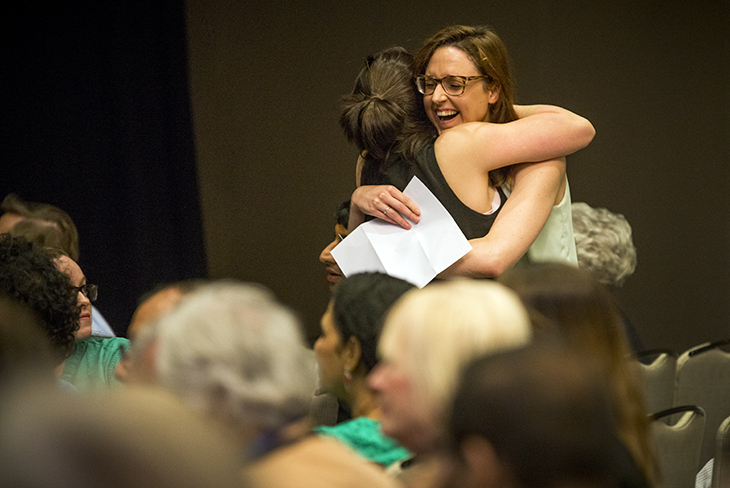A fitting match for med students

Tulane University medical student Kaitlin Hardin celebrates her good news at the Match Day ceremony on Friday (March 20). After she graduates in May, Hardin will be training in pediatrics at the University of Californiaâ“Los Angeles Medical Center. Medical students nationwide, including 181 soon-to-be doctors at Tulane, found out where they will be doing their residency training at the annual event. (Photo by Ryan Rivet)
Every March, medical students across the country learn simultaneously at which hospital or university they will start their residency training. At the Tulane University School of Medicine Match Day ceremony on Friday (March 20) at the Hyatt Regency New Orleans, anxious students with their families and friends gathered to learn where they would be going next.
The crowd was called to order by the bugle call “Charge” from the trumpet of Dr. Marc Kahn, Peterman-Prosser Professor of Medicine and senior associate dean of student affairs.
“Match Day marks the finale or culmination of a medical student"s career,” said Kahn. “It"s when they find out where they are going to be for the next stage of their life as they transition from medical student to physician.”
When the predetermined time arrived, Kahn called out students" names, handing each an envelope containing the information they were eager to learn.
At Tulane, 181 graduating senior medical students matched to residency programs around the country, with 20 students matching to programs in Louisiana. The individual results show the variety of locations and specialties for the doctors-to-be.
The National Resident Matching Program has paired medical students in the U.S. with residencies since 1952. For a period of several months leading up to Match Day, senior medical students apply to residency programs, and some of these applicants are invited to visit for interviews. The students rank the programs they like and the residency programs also rank the students who have applied to them. The National Resident Matching Program then produces computer-generated matches using specially designed algorithms.
Nationally, students applied to a total of 4,012 residency programs. Also nationally, the more popular residencies included anesthesiology, emergency medicine, internal medicine, obstetrics/gynecology, neurology and psychiatry. Less popular choices this year were radiology and transitional residencies.
Overall in the U.S., 16,932 seniors matched with residency programs, a rate of 93.4 percent.
“It"s a very important day,” said Kahn. “It"s my favorite day of the year.”
“Match Day marks the finale or culmination of a medical student's career.”—Dr. Marc Kahn, senior associate dean, School of Medicine
